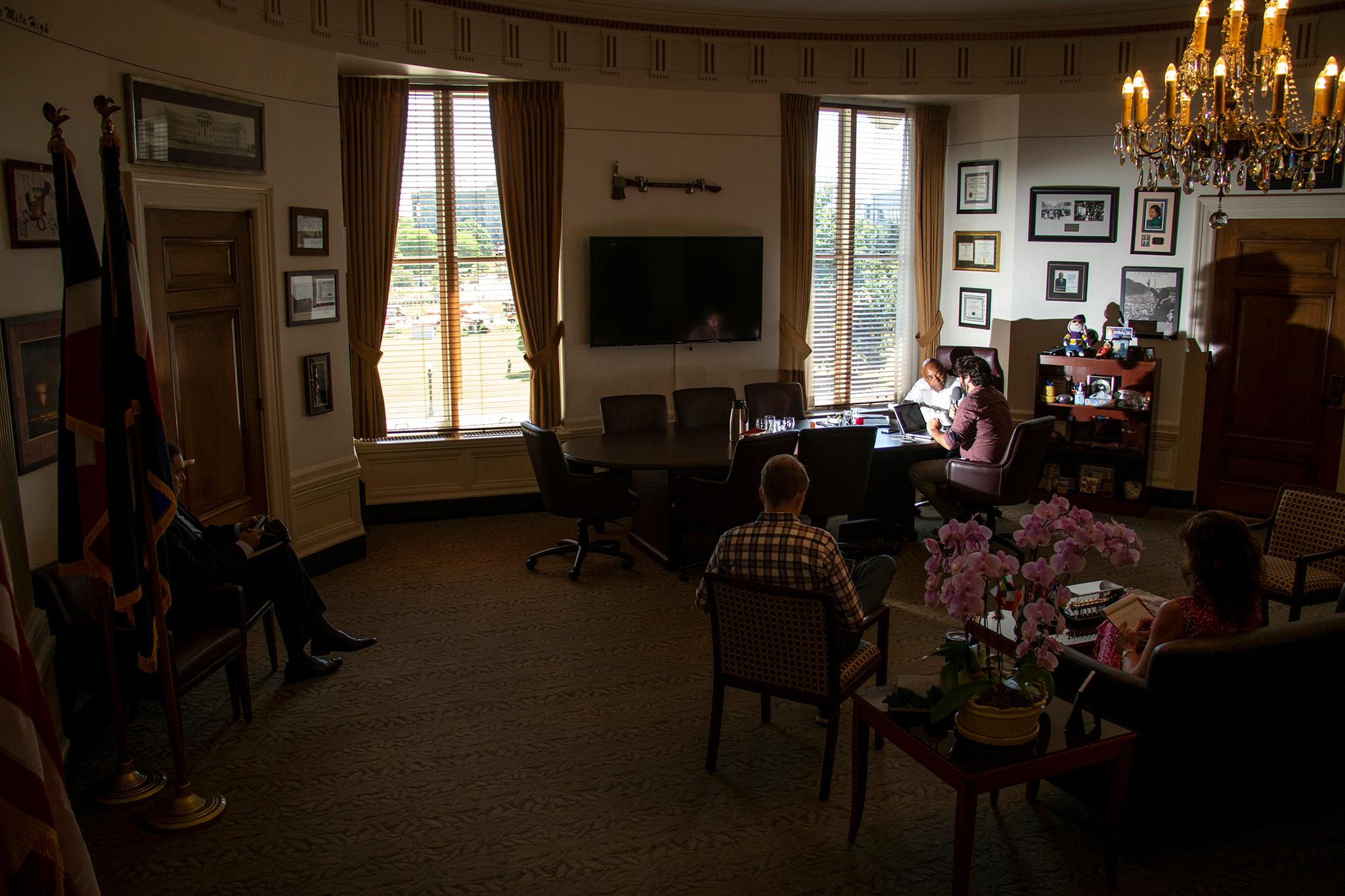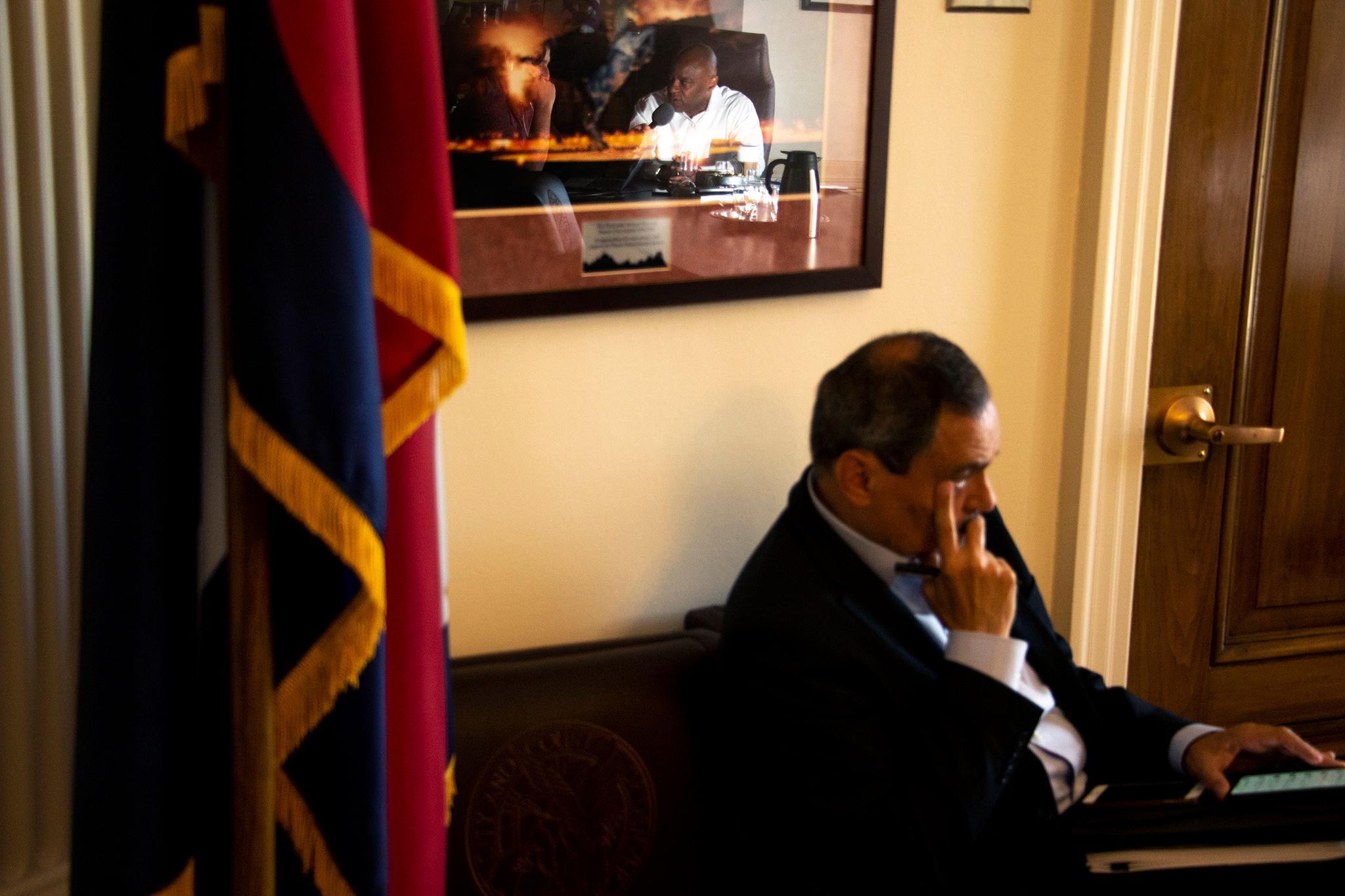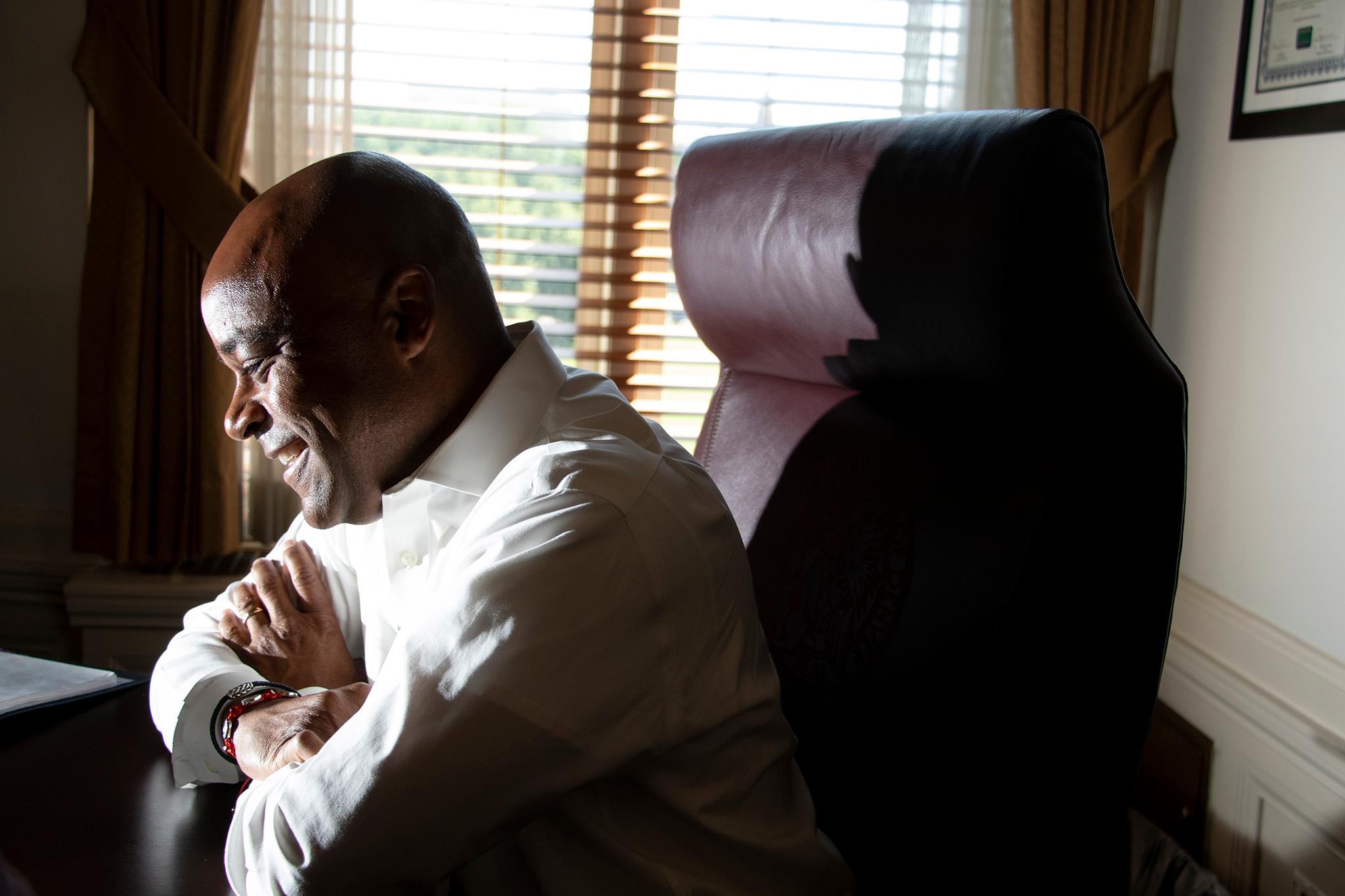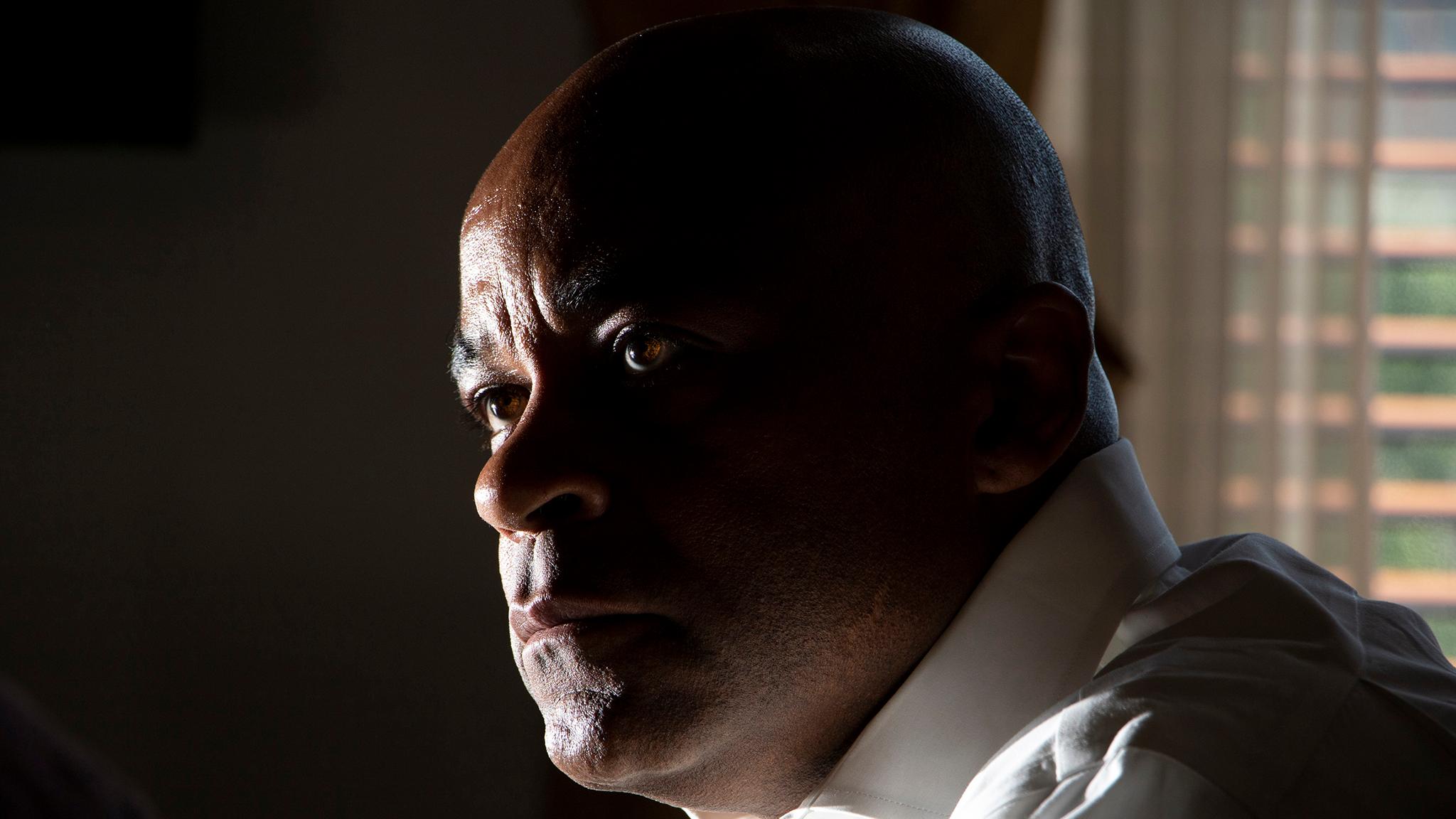Mayor Michael Hancock will retake his seat atop the city government, perhaps the most powerful position in the state in some ways, without reelection hanging over his head -- at least not for mayor.
Denver's prosperity has created growing pains. Hancock oversees a vigorous economy with a minuscule unemployment rate compared to years past. He has positioned the city as a national destination and, because of constant airport expansion, more of an international player.
He has had eight years to tackle huge problems -- displacement, homelessness, car-dependence -- but they remain problems heading into his last four. Following a testy election season, Denverite interviewed the mayor with an eye to the future.
Hancock says he has a mandate to continue the city's general trajectory, but also said he will focus on equity -- bringing up people who were left behind by the city's prosperity. He also claims the urban camping ban was never meant as a solution to homelessness, and that a third and final term frees him up, politically, to repurpose street space for transit, walking and biking without a reelection campaign to think about.
We also talked about controversial private-public partnerships, the aerotropolis and how he sees his legacy.
One hundred sixty-three thousand people didn't vote for you, so I'd like to know if you feel like you have a mandate to carry out the next four years on the same trajectory in terms of growth and development.
I think the results are exactly what we kind of thought they would be based on our history of polling -- that anywhere from 55 to 60 percent of people believe that the city is headed in the right direction and that we are addressing the challenges of growth and the opportunities that come with growth in the right manner. There are things we can do to improve but I think for the most part most people believe we're headed in the right direction. And so we're gonna always work to improve, but I think it's important that we keep the momentum of the city moving forward.
So do you feel like you have a mandate to continue on that trajectory?
I think so. I think the people spoke clearly. Anytime you get over 55 percent you have a clear mandate from the people that the direction you're going is one that we agree with, and we're gonna continue to move in that direction. But again, we heard people loud and clear that we have to address those challenges that are being brought on by the growth in this city and the fact that this is a very desirable city that people want to live in.
On election night you told Denverite that communication maybe wasn't as good as it could've been when you were talking with neighborhoods about growth and development. Have you considered how you might change the communications strategy of the city?
We're already talking internally about how we can improve it but we're also gonna do some things to learn from the public as to how we can do a better job. I think the public may have some ideas on how we can do that and get beyond the non-traditional lines of communication.
It seems that a few squeaky wheels have a lot more say because they have the time to be civically engaged -- maybe they're retired, maybe they don't have to have two jobs. If you ask some people whether they want their neighborhood to change, they might tell you to put it somewhere else. Is that fair to people who need housing?
I think we're talking about two things. You're gonna find that eight out of 10 people are gonna say, 'Don't mess it up, run the city, run the state, run the nation and let us go about our lives. We don't want to be the ones who are showing up in neighborhood meetings or at council or at committee hearings. But we don't want you to mess it up as well, and you must represent us as best you can.
The second bucket is those folks who are simply saying: Recognize the impact that this growing city is having on those who are most vulnerable. When you have such an escalation in housing cost, recognize what it means to those of us who are challenged along the economic spectrum and need to make sure we have access to good, decent, affordable, attainable housing.
That comes with empathy. That comes with falling back on my background and recognizing that there are still people who are challenged in this economy and to make sure that their voices are brought forward. And if there isn't anyone outside of myself sitting around that table, then I have to be that voice.
Do you believe it's actually possible to reach 100 percent of people? And even if you do reach them, if the decision comes out in a way that they don't like, they might feel unheard.
Well, reaching people and appeasing people are two different things. At times, there's going to be a portion or a segment of the people who are not going to be happy with your decision, but you must, through your conviction of leadership and desire to make the right decision for everybody -- the greater good for everyone.

I want to ask you about two specific things that Jamie Giellis said she would do if she were elected mayor, or at least try to do. One is 100 new tiny homes for people experiencing homelessness within a hundred days. Do you consider that a viable option moving forward?
I think the expansion of the tiny homes experiment in Denver is one thing that we're committed to and that's why we made available public land. We are committed to seeing it expanded. I don't know how practical doing it well within 100 days is based on some of the zoning and environmental challenges as well as the lack of land available to do it.
I think the mistake people tend to make is to think we have a silver bullet. The reality is that we must take our time, be smart about it and make sure we're doing it so that we don't put the homeless, who are going to be in a tiny home village, in any peril as well as make sure it is done smartly.
Another idea Giellis floated was greater oversight in the ethics department, internally, of the City and County of Denver. Is that something that you're considering altering in any way?
I don't know what greater oversight means. I think we have a strong ethics process. We have a very committed board and they just hired a new executive director that we're pretty excited about. The ethics board has gone through a regular evaluation to make sure that we're covering bases. Without specifics, I can't really respond to what those recommendations were.
It was something called a "public servant officer," like an ombudsman or an ombudswoman.
Yeah. That might be our executive director of the ethics commission right now. So that person is already in place. You know, we have a process that's in place, is not broken and when there are ethics concerns, they move appropriately through a process that was approved over almost 20 years ago, and one in which I haven't seen or found any major hiccups with the over the years.
It's 20 years old. But you don't see any reason to make it stronger or add anything or change anything?
I think any process should undergo an ongoing evaluation. Like I just said, it has gone through some evaluations, some tweaks here and there, already. And so we ought to continue that process of always looking at it.
Homelessness was a giant issue during the campaign. It's a very visible issue, obviously, in Denver. Do you agree that the urban camping ban your administration instituted has not solved the issue of homelessness?
The camping ban was never meant to solve the issue of homelessness. It was really brought in as a guard rail with regards to our policies and our implementation of our policies, and efforts around homelessness. But it was not meant to be a solution to homelessness.
These are not just political speaking points. This is a very complex issue and that's why you have so many stakeholders from so many different disciplines engaged and trying to solve homelessness, whether it's mental health or drug and alcohol addiction, housing, familial disassociation, the LGBTQ community, the faith community. For every person who's homeless, there's a tailored approach to address the challenges of that individual. It takes time. Every city across this country is dealing with this challenge.
Comparatively, Denver has seen a 34 percent decrease in homelessness over the last five years because we're taking the very thoughtful, methodical approach to help each individual come off the streets. And I get it. When people see homeless in our city, particularly people who are chronically homeless, one of the questions -- instead of saying what's wrong with that person -- is why we have homelessness. What is it that we need to bring to bear to help that individual help themselves?
Where does that stat come from? About the 34 percent decrease?
Our time and place surveys that are taking place. Every year we've seen a decrease in the number of homeless being counted.
Isn't it true that those counts are known to not be that accurate?
You've got to have some source that gives you a hint or a picture of what your homelessness looks like in your city. And we have not found a more reliable source at this point in time. When the numbers are loud, you guys say there's a lot of homeless in the city. Now we say we're seeing a decrease and you're questioning whether or not those numbers are valid.
You've said you're going to start a department of housing and homelessness. Can you explain what it will do that the city doesn't do already? And will it be a brand new department for real? Or is it really just be a reshuffling of internal staffers?
It's going to be a new department that really consolidates the various service agencies that provide service to the homeless in the city of Denver under our government umbrella. And the reality is, as an audit pointed out, we are too fragmented across the city. Everyone's trying to do what they can under their responsibilities to home, to house, to assist the homeless. But when you have it federated like that, it's hard to keep the services coordinated, keep people out of silos and make sure we're being efficient with resources. And so bringing it all under one roof, under one leader who we know where the buck stops and who is accountable, we believe is going to help us to improve our effectiveness and improve our efficiency and to help us maximize the impact.
Will there be more funding involved in this?
Yeah, I believe so. We have talked about whatever new resources we need to bring to bear, we're going to do that to help them meet the challenge of homelessness as well as housing in the city.
One of the other ideas brought up during this election was the idea of a sanctioned camping sites where job training, mental health services, that sort of thing, would be wrapped around these sites? And what would be the process of looking at that, specifically?
Let me clarify. I have looked at sanctioned campsites in the city of Denver. I'm willing to talk to people about their ideas and if I hear something new, you know, maybe we'll get a hook on it. But let me be clear to you that in cities where they have experimented with sanctioned homeless encampments, I've not found one experiment that has gone well. In fact, they typically go off the rails pretty quickly. So you're going to find in me someone who was highly skeptical that they can work. I typically lean toward models like tiny home villages, where there is a more structured process to identify who's in and how we progress people through, how they self-govern and hold each other accountable.
Can you be more specific about why they don't work?
What I saw in Portland, Oregon, for example -- you're not able to address more immediately the challenges of the individuals who come in there. And so you've got the criminal element that embeds themselves with the homeless. You have those who simply have mental health deficiencies that are not being addressed, as well. And that creates some challenges within the encampments themselves. They become Petri dishes for disease.
So we won't expect that in the next four years coming from this administration.
The chances are, if you're betting, probably not, but what you will see our continued efforts to bring about some of the most innovative efforts, like tiny villages, like our social impact bond efforts, a solutions center -- expansion of those types of programs.

Let's switch subjects to public-private partnerships, also known as P3s. This is what Denver is about and Colorado is about to finance big capital projects. But Denver International Airport's Great Hall is $311 million over budget, according to the contractor. You dispute that. Why?
Because you're hearing from the contractor and the developer. You're not hearing from the owner, which is Denver International Airport. That developer has a responsibility to give the best forecast they can with regards to what their understanding is of the circumstances. And we just simply were not done with our analysis. And the most recent report that we received this week is that there is not a concern or an issue with the concrete.
Who told you there's no problem with the concrete?
Third-party evaluators who took a look at the system for us.
Okay, but $311 million is still a pretty big discrepancy. Regardless of who is right, what do you say to Denverites who look at this public-private partnership to convince them that P3s are the answer, especially given the other P3s that have gone wrong in the city?
What P3 has gone wrong?
I'm thinking of RTD and the amount of money spent on the trains, but they won't have enough for one to Boulder. And there are lawsuits with Denver Transit Partners, their P3 partners, for tens of millions of taxpayer dollars.
It's really a transfer of the burden of delivering these capital projects. It's an opportunity for us to actually realize something, whereas the public sector probably couldn't afford it to do by itself without disproportionately burdening the taxpayer. With the Great Hall and in the RTD situation, you have a third-party private sector saying, 'You know, for the return on investment, we'll come in and take most of the burden of delivering this project. The burden really rests on the partner with a contract at the Great Hall. RTD is trying to figure out these things we didn't expect, just like the Great Hall.
Let's talk about transportation. You have four years left to carry out your commitments to making this city and the environment better through transit, walking and biking. You can make transit immediately better by painting a bus lane on a street. You no longer have to worry about reelection. Do you have more leeway to actually repurpose parking and general travel lanes for biking and buses?
Yes.
So will you carry that out in the next four years, and what's the first step?
We have been doing some education and best practices for ourselves over the last, maybe a couple of years now. And I think that we all have come to a realization, as we've looked around the world, quite frankly, that we can do better with regards to our striping and paving in the city of Denver. So you will see us moving more aggressively in that direction over the next year or two.
What do you want your legacy to be after 12 years heading Denver?
I'll be honest with you, I don't really spend much time thinking about legacy. I let other people think about that. What I came in focused on is how we make the city better for children in the hope that when I'm done, people see that the city is a much better city for children to grow up in and be healthy and productive.
We've seen this city become a much safer city in the midst of our present growth. I try to make the city more globally competitive. I know now, and we all know, that Denver without question is a more globally competitive city. And I wanted to make the city a very desirable place to live in. In 2010, 2011, we were nowhere on the list of the best places to live in America today. And perennially over the last five to six years, we've been at number one, two or three. I think that says a lot for the progress we've made as a city. And I'm proud of that.
That's a broad brush that paints a picture of some people, but not others who have obviously been displaced. So that's also going to be a part of your legacy, isn't that right?
Well, what I think you'll see is that where cities have grown and have become very desirable, the challenge is that people become displaced. But great cities also recognize that we've got to go back and make sure we're able to bring individuals along -- the entire spectrum -- and give people an opportunity to be healthy, to find a job, to build a home, and to build a future in this city.
And that's where, in the third term, I'm going to be exponentially focused -- under the umbrella of equity in the city. It's going about making sure we level the playing field and create balance in terms of our growth, and make sure that we can counter displacement in our city. I believe we can do it and I'm going to be extremely focused on it.

A lot of people would say the aerotropolis -- a sort of city outside of the city anchored by the airport -- might be your legacy. Tell me why it's not sprawl to build out by the airport when there's infill that could be happening here in the center city?
The reality is that aerotropoli occur naturally around airports. And what I did as a candidate in 2011 is really called it out and said we're going to work to manage what's going to happen at the airport. Are we going to allow it to happen haphazardly? And so I called out the term aerotropolis and really brought it into our urban vernacular, if you will. Let's work with the landowners around there and let's make sure we allow for the development that's going to occur out there to be smart, sustainable, and one in which really helps the airport to be the best that it can be.
You can go around the world today and you'll see aerotropli everywhere. Some of it haphazardly, some well planned and thought out like down in Dallas-Fort Worth. That's really what we're talking about here in Denver, because there's commercial activity and programming that simply needs to be near the airport if they're going to be in our area.
So it's not sprawl?
I'm not gonna answer a question of whether it's sprawl or not. It is an economic center. And so there are businesses and activity that want to be near the airport. So we as a city either let it happen haphazardly without any thought or engagement from the city, without our values of sustainability or not. And I think that's what we're doing.
Do you have political aspirations beyond being mayor of Denver when you're done?
I have aspirations to love my family, to keep them healthy and to live a productive life when I'm done being mayor.













